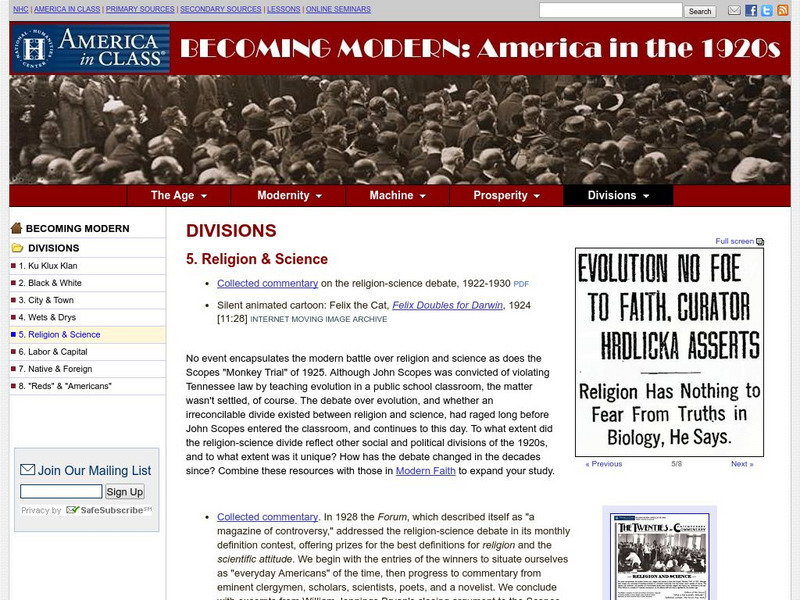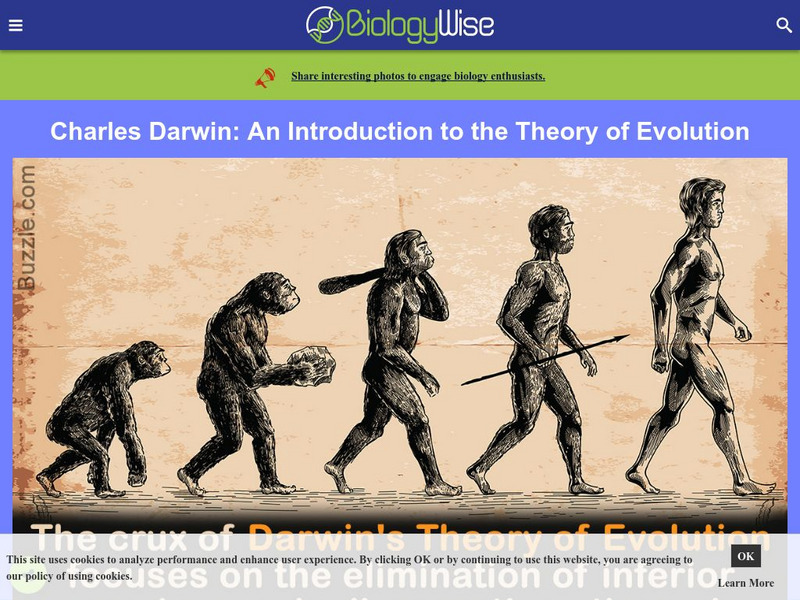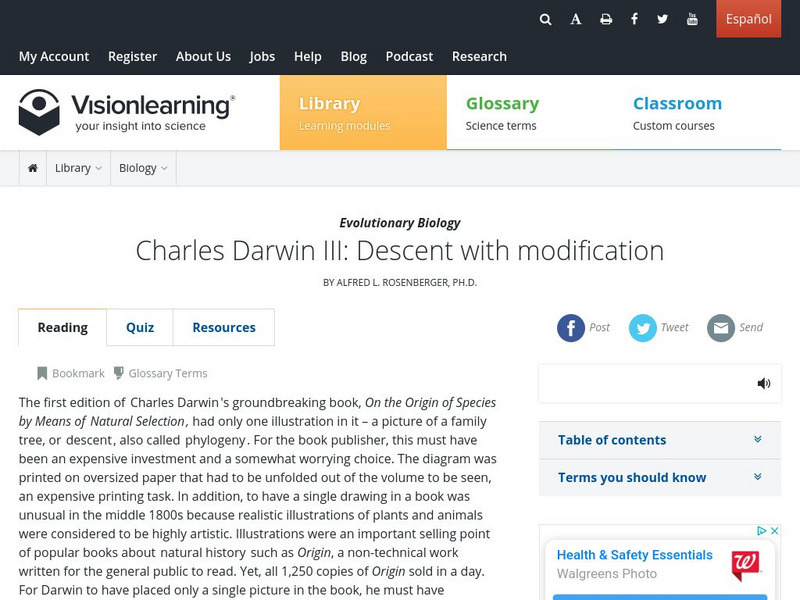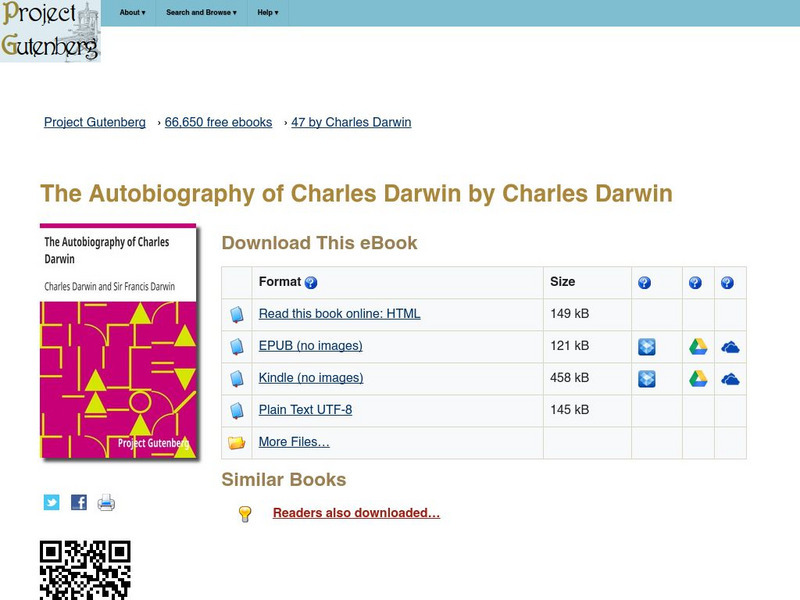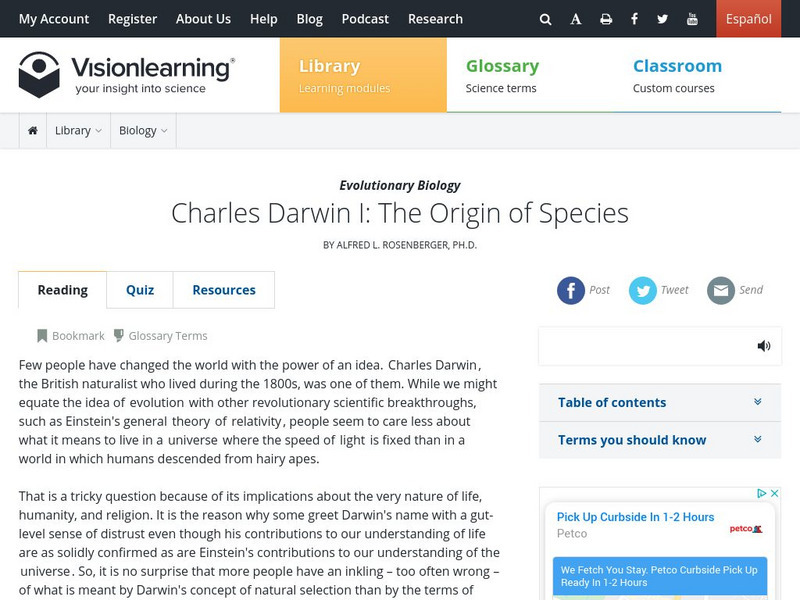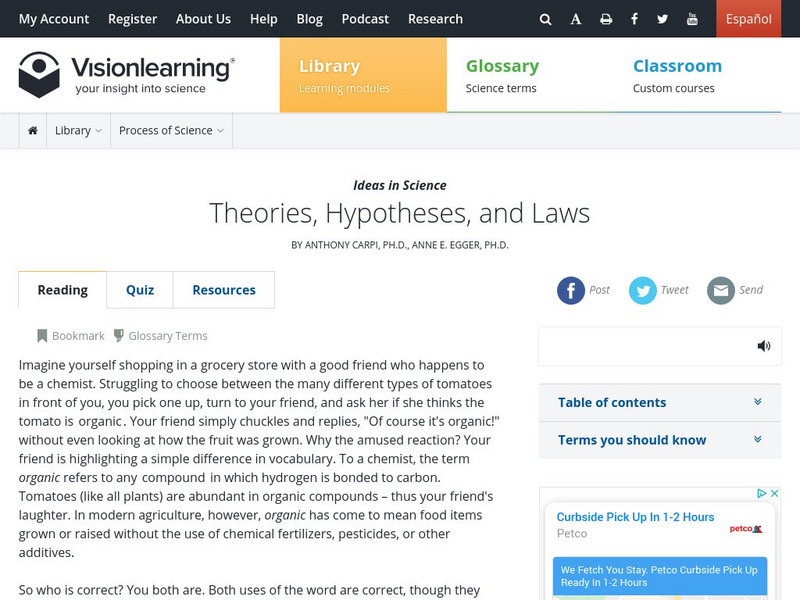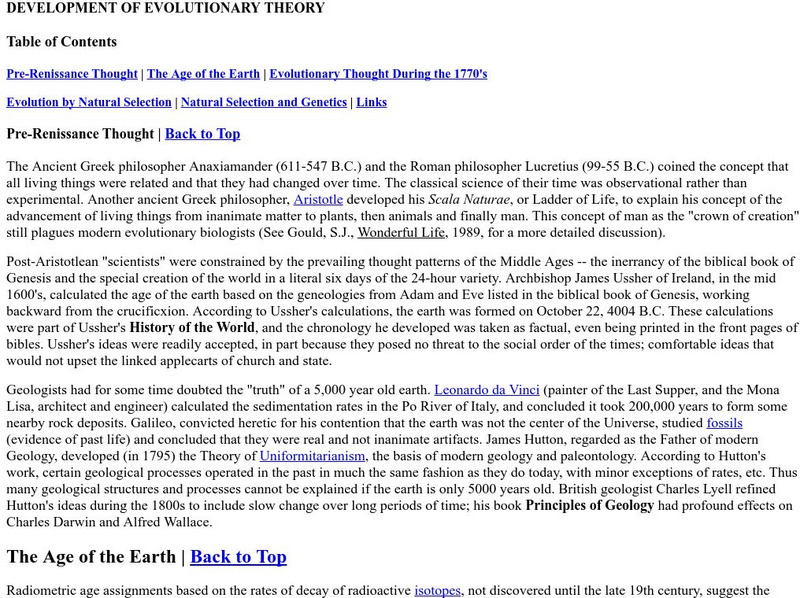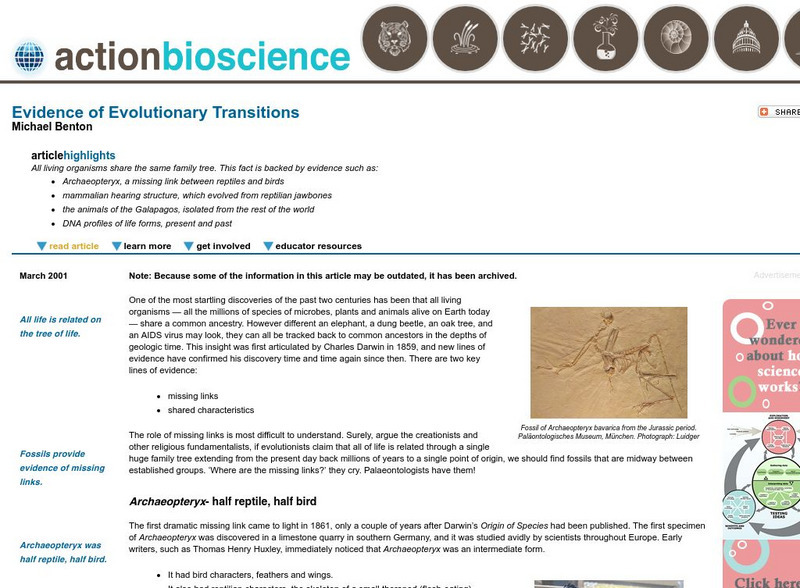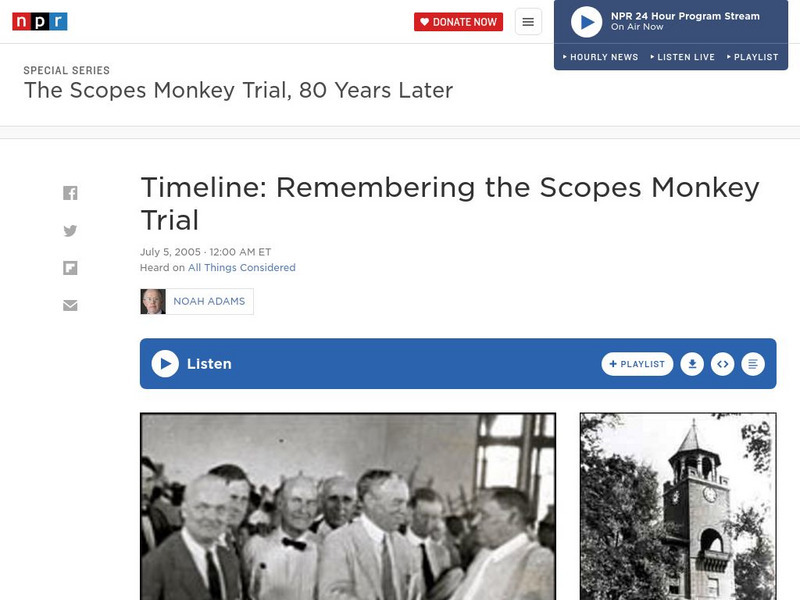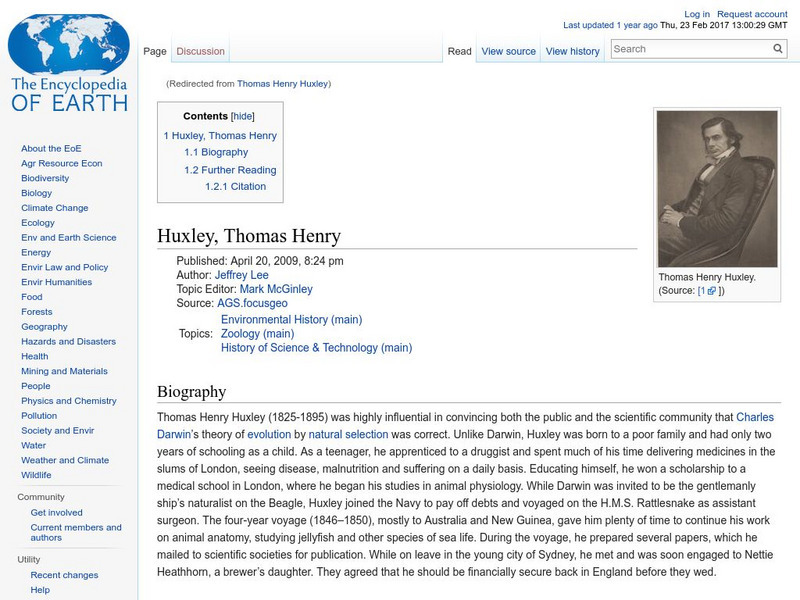BiologyWise
Biology Wise: A Brief Summary of Lamarck's Theory of Evolution
Discusses Lamarck's theory of evolution, which was developed before Charles Darwin's own theory, and how it fared over time. The core ideas in Lamarck's theory are described and his theory and Darwin's are compared. Lamarck's ideas...
National Humanities Center
National Humanities Center: America in Class: America in the 1920s: Religion & Science
The National Humanities Center presents collections of primary resources compatible with the Common Core State Standards - historical documents, literary texts, and works of art - thematically organized with notes and discussion...
BiologyWise
Biology Wise: Charles Darwin: Introduction to the Theory of Evolution
The main concepts in Charles Darwin's theory of evolution are described, how natural selection works, and the ongoing criticism of evolution from Creationists.
Open Curriculum
Open Curriculum: Darwin and the Theory of Evolution
Students will be able to identify important ideas Darwin developed during the voyage of the Beagle, and give examples of his observations that supported those ideas.
PBS
Pbs Learning Media: Darwin's Letters: Collecting Evidence
This group of letters is a sample of the extensive correspondence Darwin carried on with a wide group of friends and colleagues as he collected evidence to support his theory of evolution by natural selection. From Charles Darwin's...
Vision Learning
Visionlearning: Biology: Charles Darwin Iii: Descent With Modification
Instructional module focusing on Charles Darwin's theory of Descent with Modification. Discusses how slight changes from parent to offspring create variation and potentially create new species over time. Site also includes an interactive...
Cornell University
Cornell University: Library: Charles Darwin After the Origin
In honor of Darwin's 200th birthday and the 150th anniversary of the publication of "The Origin of the Species," Cornell has put together an extensive collection of Darwin's work during the last two decades of his life.
Khan Academy
Khan Academy: Ap Us History: 1865 1898: Social Darwinism in the Gilded Age
Discusses Social Darwinism and the negative repercussions it had on society during the Gilded Age. Includes questions for students at end.
NPR: National Public Radio
Npr: Taking Issue: Evolution and Religious Faith
Learn what five different religions have to say about the shaping of life and evolution. [August 8, 2005]
Project Gutenberg
Project Gutenberg: The Autobiography of Charles Darwin
Resource presents multiple digital formats of this literary text. You can read about the famous scientist's life in his own words, as he recalled his thoughts and actions for his children.
Open Curriculum
Open Curriculum: Evidence for Evolution
With this article, students will be able to clarify the significance of a scientific theory and recognize that Darwin supported his theory with a great deal of evidence, and that many kinds of evidence since his time have further...
Vision Learning
Visionlearning: Biology: Charles Darwin I: The Origin of Species
Instructional module focusing on the early work of Charles Darwin. Discusses Darwin's key role in supporting and describing the theory of evolution as driven by natural selection. Site also includes an interactive practice quiz and links...
Vision Learning
Visionlearning: Ideas in Science: Theories, Hypotheses, and Laws
Learning module looking at scientific explanations. Discussion covers theories and how they develop, some well-known theories and their origins, and how theories are revised and refined. Also, covers hypotheses and laws. The three...
Estrella Mountain Community College
Online Biology Book: Development of Evolutionary Theory
Using diagrams and descriptive illustrations, this college-level biology reference book discusses the development of evolutionary theory.
Famous Scientists
Famous Scientists: Charles Darwin
A short biography of Charles Darwin, and how he discovered evolutionary theory and natural selection.
University of California
University of California Museum of Paleontology: Fossil Evidence
Understanding Evolution provides evidence for evolution using fossils. There are also links to lesson plans.
National Humanities Center
National Humanities Center: America in Class: America in the 1920s: Felix the Cat
The National Humanities Center presents collections of primary resources compatible with the Common Core State Standards - historical documents, literary texts, and works of art - thematically organized with notes and discussion...
Google
Google Maps: Galapagos Islands
Explore isolated volcanic islands. Charles Darwin's observations and collections of the Galapagos wildlife in 1835 contributed to his theory of evolution by natural selection. [7:08]
American Institute of Biological Sciences
Action Bioscience: Evidence of Evolutionary Transitions
Charles Darwin's theory that all living organisms are connected in some way has been confirmed through intense studies over centuries. Understand the similarities that bond all things living to the same family tree by checking out this...
NPR: National Public Radio
Npr: Timeline: Remembering the Scopes Monkey Trial
NPR presents a timeline on the events surrounding the Scopes Monkey Trial. Includes photos, recollections and information on the people involved in the trial.
Famous Scientists
Famous Scientists: Alfred Russel Wallace
Learn about the life and work of Alfred Wallace, who is best known for independently conceiving the theory of evolution through natural selection; his paper on the subject was jointly published with some of Charles Darwin's writings.
British Library
British Library: Discovering Literature: Romantics & Victorians Fin De Siecle
Read articles that address the following questions about the end of the 19th-century literature: What are the key tropes of late 19th-century literature? How did writers respond to the desires and anxieties of the time? How did...
Encyclopedia of Earth
Encyclopedia of Earth: Huxley, Thomas Henry
A biography of Thomas Henry Huxley, a contemporary of Charles Darwin, and a strong supporter of his theory of evolution.
British Library
British Library: Discovering Literature: Romantics & Victorians Technology
The 19th century saw a rapid technological change, together with paradigm shifts in scientific understanding. These articles research how authors responded to the new possibilities afforded by technology and science.

